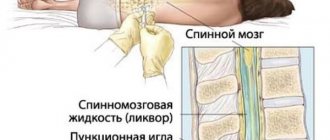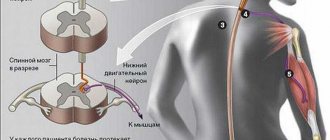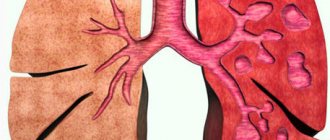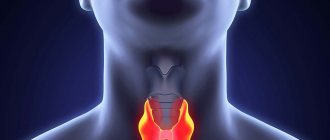Causes
Causes of hypopituitarism:
- a brain tumor;
- pituitary insufficiency develops due to the death (necrosis) of an area of the brain (pituitary gland);
- consequences of irradiation of the hypothalamus or pituitary gland;
- consequences of any surgical interventions;
- inflammation of the pituitary gland.
Causes of postpartum hypopituitarism in women (Schien's disease):
- severe blood loss during childbirth;
- blood poisoning (septic condition) with the formation of a blood clot.
The pituitary gland – where is it and what role does it play?
The pituitary gland is an endocrine gland or organ that produces hormones. It weighs only half a gram, but you can safely call it an endocrine control center. It is located deep inside the skull, near the sella turcica (the characteristic bony cavity in the skull) and is closely connected to the hypothalamus of the brain.
Functionally and anatomically, the pituitary gland is divided into three parts: anterior, middle and posterior.
The posterior pituitary gland is separated from the hypothalamus and is part of it; it does not release its own hormones, but only stores and releases the hypothalamic hormones, oxytocin (the “bonding hormone” important during fertilization, orgasm and childbirth) and vasopressin (an antidiuretic hormone that reduces the amount of urine produced and thus prevents dehydration).
The anterior and middle parts of the pituitary gland are formed from the epithelium of the secondary palate and are functionally different from the hypothalamus. Each of them secretes different hormones that are important for the functioning of the body. They are responsible for growth and sexual development, but also control the functioning of other endocrine glands. A large group is pituitary hormones associated with the sexual cycle, especially in women.
Symptoms
The following are the symptoms of pituitary insufficiency in adults:
- deficiency of somatotropin (growth hormone), which involves: a decrease in muscle mass and an increase in the percentage of adipose tissue due to an increase in organ (visceral) fat;
- increased risk of any fractures and decreased bone mineral density;
- decreased endurance to any physical activity;
- an increase in cholesterol content, which is accompanied by its deposition in the walls of the vessel (atherosclerosis);
- decreased sweating, dry skin and thinning;
- sleep disturbance (drowsiness during the day, insomnia at night);
- psychological disorders: low self-esteem, depression, tendency to apathy;
- in women: amenorrhea, irregular menstruation, infertility;
- absence or decreased sexual desire, weakened erection;
- decreased physical and mental activity, lethargy, drowsiness;
- fatigue, weakness;
To identify hypopituitarism in children, you need to pay attention to the following symptoms:
- deficiency of somatotropin (growth hormone deficiency), which is accompanied by: growth retardation progresses from an early age. If a child is diagnosed with hypopituitarism, he will be a couple of years behind his peers in development.
- manifestations: small facial features;
- short neck;
- small feet and hands;
- round head;
- increased risk of fractures and decreased bone density;
- endurance to any physical activity decreases;
- sweating decreases, the skin becomes thinner, and becomes dry;
- in boys: very tall or dwarfism;
- very tall or dwarfism;
- decreased physical and mental activity, lethargy, drowsiness;
- fatigue, weakness;
Multihormonal pituitary insufficiency
This disease associated with hypopituitarism is difficult to describe symptomatically without dividing the group of symptoms into those caused by a deficiency of certain hormones. TSH deficiency is associated with symptoms of secondary hypothyroidism. These include:
- increased fatigue,
- feeling of muscle weakness,
- violations of thermoregulation (feeling cold regardless of air temperature),
- weight gain,
- recurrent constipation,
- neck swelling
- hoarseness,
- problems with memory and concentration,
- depressive disorder, depressed mood, thoughts of suicide,
- darkening of the skin in the joints (knees, elbows),
- thickening of facial features,
- water retention in the body,
- decreased libido and erectile dysfunction,
- fertility problems in women.
Symptoms of polyhormonal pituitary insufficiency are usually less pronounced than in the case of primary hypopituitarism associated with damage to this organ. However, they are so clear that they may cause concern and prompt you to see a GP who will order further diagnostics.
ACTH deficiency
ACTH deficiency is associated with symptoms of adrenal insufficiency, that is, a deficiency of corticosteroids (cortisol) and androgens (mainly aldosterone).
Symptoms include:
- weight loss and loss of appetite,
- nausea and vomiting,
- low blood pressure, low blood pressure, low blood pressure,
- orthostatic hypotension (drop in blood pressure and weakness when standing or standing for long periods of time),
- hypoglycemia,
- fainting,
- decreased skin pigmentation (pallor),
- electrolyte imbalance.
Deficiency of gonadotropins (LH, FSH, PRL)
Gonadotropins are a group of hormones associated with the sexual cycle of both women and men. Their deficiency leads to the appearance of symptoms associated with the reproductive system, impaired fertility, sexual life or lactation. Symptoms of gonadotropin deficiency resulting from hypopituitarism include:
- in women: interruption or disruption of the menstrual cycle,
- in men: erectile dysfunction,
- decreased libido,
- reduction of genital hair,
- lack of lactation after childbirth (prolactin deficiency).
Vasopressin deficiency
The main symptoms of vasopressin deficiency are polyuria and increased thirst, two symptoms called central diabetes insipidus (caused by the pituitary gland). The task of vasopressin is to stimulate the absorption of water in the renal tubules, thereby thickening the urine and reducing its volume. If left untreated, vasopressin deficiency leads to dangerous dehydration, even in the face of thirst and increased fluid intake.
Diagnostics
Diagnosis of hypopituitarism includes:
- analysis of medical history and complaints. It is necessary to clarify with the patient: when complaints of decreased blood (arterial) pressure, complaints of weakness first appeared;
- whether the patient often suffers from any infectious diseases;
- have you ever had a stroke or traumatic brain injury?
- It is worth checking with the woman whether there was heavy blood loss in the first postpartum period;
- pale and dry skin;
- a complete study of the concentration of somatotropic hormone (growth hormone) during stimulation tests caused by the administration of insulin;
- study of the level of follicle-stimulating and luteinizing hormones;
Classification of hypopituitarism
Hypopituitarism is a disease that develops due to insufficiency of the anterior pituitary gland.
Pituitary insufficiency can occur in different forms:
- isolated: the secretion of only one hormone of the anterior pituitary gland, for example, somatotropin or thyrotropin, is impaired;
- partial (partial): two or three, but no more, hormones of the anterior pituitary gland are not produced;
- total - the biosynthesis of all tropic hormones of the adenohypophysis is sharply reduced or completely stopped.
There is also a condition called intermedio-pituitary insufficiency, in which insufficiency of pituitary function is combined with another endocrine pathology, diabetes insipidus.
Symptomatic treatment
For the treatment of myocardial dystrophy, agents are used that improve metabolic processes in the myocardium, promoting the synthesis of protein and high-energy compounds (riboxin, phosphaden, sodium adenosine monophosphate, cocarboxylase, lipoic acid, pyridoxal phosphate).
If the functional capacity of the liver is impaired, treatment is carried out with hepatoprotectors (Essentiale, Katergen, Karsil), and multivitamin complexes.
If the secretory function of the stomach and the exocrine function of the pancreas are impaired, drugs containing digestive enzymes (panzinorm, festal, mezim-forte, pancreatin, etc.) are prescribed.
Types of syndrome
- Light form. It is characterized by frequent and prolonged headache, weakness and fatigue, and a tendency to hypotension. A slight disruption of the menstrual cycle and a decrease in blood pressure are also possible.
- With moderate severity of the syndrome, weight loss and deterioration of skin and hair condition are added to the above symptoms. Blood pressure in this condition not only drops, but can lead to fainting and collapse. There may also be hypofunction of the ovaries, causing infertility. Disruption of the thyroid gland leads to fluid retention in the body and, as a result, swelling.
- The severe form of the disease occurs with total hypofunction of the pituitary gland and has the following symptoms:
- Anemia that does not respond to conventional treatment;
- Severe weight loss, up to cachexia;
- Very severe weakness, drowsiness, memory loss;
- Hypotrophy of the genital organs;
- Deterioration in appearance: baldness, skin pigmentation, premature aging.
Questions to ask your doctor
- What is the likely cause of hypopituitarism in my case?
- What are the results of my tests and/or examinations? What do they mean?
- What treatment methods are optimal? Will I need surgery?
- What risks are associated with the operation?
- Will I have to take medications? If yes, for how long?
- Am I at risk of experiencing a medical emergency? What precautions can I take?
- What symptoms indicate a worsening condition?
- Am I at risk for any long-term health problems?
( 1 votes, average: 5.00 out of 5)
Loading…
Prognosis for hypopituitarism
The leading treatment method for hypopituitarism is hormone replacement therapy.
The patient is prescribed a drug for the missing hormone. If the disease is not detected at a deep stage and sufficient doses of the missing hormones are prescribed in a timely manner, the quality of life of patients improves significantly, that is, the prognosis is favorable.
Medical nutrition
With hypopituitarism, patients experience significant weight loss up to severe exhaustion. Therefore, it is necessary to provide high-calorie nutrition with a sufficient content of animal protein, fats, carbohydrates, vitamins, and microelements. Meals should be small (patients cannot take a lot of food at one time), frequent. It is also advisable to carry out parenteral nutrition (intravenous drip administration of amino acid preparations, native plasma, albumin, glucose solutions, fat emulsions - intralipid, lipofundin).











